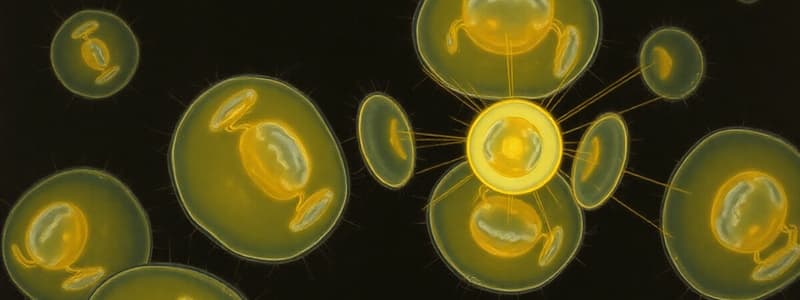Podcast
Questions and Answers
Which of the following is the dependent variable in the osmosis and potato practical?
Which of the following is the dependent variable in the osmosis and potato practical?
- Concentration
- Volume of solution
- Change in mass (correct)
- Time
In microscopy, important observations should be drawn with a pen.
In microscopy, important observations should be drawn with a pen.
False (B)
What is the process called when a cell becomes specialised?
What is the process called when a cell becomes specialised?
Differentiation
The ______ transports water around the plant.
The ______ transports water around the plant.
Match each specialised cell with its correct function:
Match each specialised cell with its correct function:
What is the primary function of the alveoli in the lungs?
What is the primary function of the alveoli in the lungs?
Villi in the small intestine decrease the surface area ratio to absorb more digested food.
Villi in the small intestine decrease the surface area ratio to absorb more digested food.
What is the process called that involves the movement of water molecules across a semi-permeable membrane?
What is the process called that involves the movement of water molecules across a semi-permeable membrane?
The gills of fish have structures called ______ that provide a large surface area for gas exchange.
The gills of fish have structures called ______ that provide a large surface area for gas exchange.
Match the following terms with their definitions:
Match the following terms with their definitions:
Which of these components is NOT found in animal cells?
Which of these components is NOT found in animal cells?
Bacterial cells contain a true nucleus.
Bacterial cells contain a true nucleus.
What is the standard form of the number 0.0006?
What is the standard form of the number 0.0006?
The magnification is calculated by dividing the __________ by the actual size.
The magnification is calculated by dividing the __________ by the actual size.
Match the following cell types with their main characteristics:
Match the following cell types with their main characteristics:
What is one role of stem cells?
What is one role of stem cells?
Adult stem cells can differentiate into any type of cell.
Adult stem cells can differentiate into any type of cell.
The ________ consists of paired homologous chromosomes in humans.
The ________ consists of paired homologous chromosomes in humans.
Flashcards
Microscope Parts
Microscope Parts
The components of a light microscope, including the stage, stage clips, eyepiece, objective lens, light source, and focusing wheels.
Potato Osmosis IV
Potato Osmosis IV
An experiment measuring the mass change in potato cylinders when immersed in different sugar solutions.
Specialised Plant Cells
Specialised Plant Cells
Cells in plants that have specific functions, like transporting water or food, or absorbing water in the roots.
Independent Variable (Osmosis)
Independent Variable (Osmosis)
Signup and view all the flashcards
Cell Differentiation
Cell Differentiation
Signup and view all the flashcards
Surface Area & Exchange
Surface Area & Exchange
Signup and view all the flashcards
Alveoli: Gas Exchange
Alveoli: Gas Exchange
Signup and view all the flashcards
Villi: Food Absorption
Villi: Food Absorption
Signup and view all the flashcards
Diffusion: Spreading Out
Diffusion: Spreading Out
Signup and view all the flashcards
Osmosis: Water Movement
Osmosis: Water Movement
Signup and view all the flashcards
Magnification
Magnification
Signup and view all the flashcards
Micrometers to Millimeters
Micrometers to Millimeters
Signup and view all the flashcards
Standard Form (Scientific Notation)
Standard Form (Scientific Notation)
Signup and view all the flashcards
Prokaryotic Cell
Prokaryotic Cell
Signup and view all the flashcards
Eukaryotic Cell
Eukaryotic Cell
Signup and view all the flashcards
Stem Cell Types
Stem Cell Types
Signup and view all the flashcards
Stem Cell Research Arguments
Stem Cell Research Arguments
Signup and view all the flashcards
Plant Stem Cells (Meristem)
Plant Stem Cells (Meristem)
Signup and view all the flashcards
Study Notes
Specialized Cells
- Specialized cells have specific functions adapted to their role
- Sperm cells are for fertilization, muscle cells for movement, and nerve cells for communication
- These adaptations, like long tails for sperm, or long fibers for nerve cells, improve their function
Animal and Plant Cells
- Plant and animal cells have structural differences; for example, plant cells have cell walls, while animal cells do not
- Animal cells do contain mitochondria, but plant cells do include chloroplasts
Bacterial Cells
- Bacterial cells lack a nucleus, a unique feature distinguishing them from plant and animal cells
- Bacterial cells have a cell wall, a distinguishing characteristic and they also have a cell membrane
Chromosomes and Mitosis
- Humans have 46 chromosomes, consisting of DNA
- Mitosis is the duplication and distribution of chromosomes
- This is a crucial cell division process enabling growth and repair
Stem Cells
- Stem cells are undifferentiated cells, meaning they can become many different types of cells
- Stem cells offer potential for medical therapies and research
Exchange - Humans
- Specialized exchange organs like the lungs & intestines have large surface areas
- This feature, enhanced by folds and thin walls, enables efficient material exchange, such as the uptake of oxygen in the lungs.
Exchange in Plants
- Carbon dioxide and oxygen diffusion in plants occur in the leaves, aided by large surface areas of mesophyll cells.
- The stomata (pores on the leaf surface) regulate these gas exchanges.
Key Processes
- Diffusion is the movement of particles from high to low concentration areas
- Osmosis is a specific type of diffusion, involving water movement
- Active transport is the movement of substances against a concentration gradient, requiring energy.
Studying That Suits You
Use AI to generate personalized quizzes and flashcards to suit your learning preferences.
Related Documents
Description
Test your knowledge on various cell types, including specialized, plant, animal, and bacterial cells. Learn about the unique structures and functions of these cells, along with critical processes like mitosis and the role of stem cells in biology.




